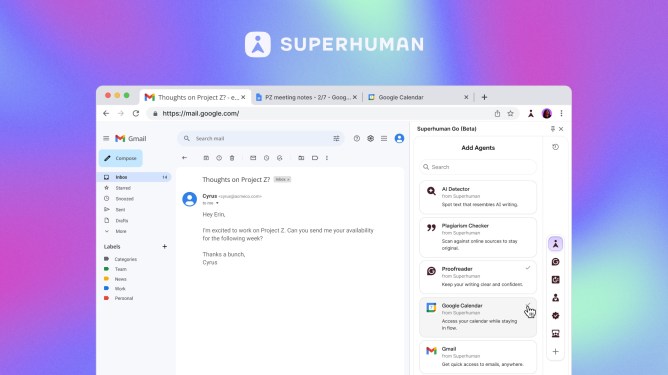Typically, when a company acquires another, it absorbs the new company’s branding or integrates it with its own identity. Grammarly is doing something different. After acquiring the email client Superhuman in July, the company is renaming itself “Superhuman.”
Despite this branding change, the Grammarly product will continue to be known by its current name. However, the company says it is thinking about rebranding other products in the long run, such as Coda, a productivity platform it acquired last year.
The company is also launching an AI assistant called Superhuman Go that is built into Grammarly’s existing extension. This assistant can provide writing suggestions and give feedback on emails. Users can connect it with other apps like Jira, Gmail, Google Drive, and Google Calendar to provide it with more context. The assistant can then use these connections to perform tasks such as logging support tickets or fetching your availability when scheduling a meeting.
Superhuman said it plans to add more functionality, enabling the assistant to fetch data from sources like customer relationship management systems and internal systems to suggest changes to your emails.
Users can try Superhuman Go by turning on a toggle in the Grammarly extension, which will allow them to connect it to different apps. They can also try out different agents from the company’s agent store, including a plagiarism checker and a proofreader that launched in August.
All Grammarly users can try Superhuman Go right now, though the company is also selling product bundles. Its Pro subscription plan will cost twelve dollars per month when billed annually and will enable grammar and tone support in multiple languages. The Business plan will cost thirty-three dollars per month when billed annually and will give users access to Superhuman Mail.
Superhuman said it also wants to add more AI-powered features to the Coda document suite and Superhuman email clients. These features could fetch details from external and internal sources to automatically create additional details in documents and email drafts.
Grammarly has for the past few years made a concerted effort to increase its viability as a productivity suite, exemplified through its acquisitions of Coda and Superhuman. With this new AI assistant, the company is positioning itself to compete better with other productivity platforms like Notion, ClickUp, and Google Workspace, all of which have launched multiple AI-powered features in the past few years.

